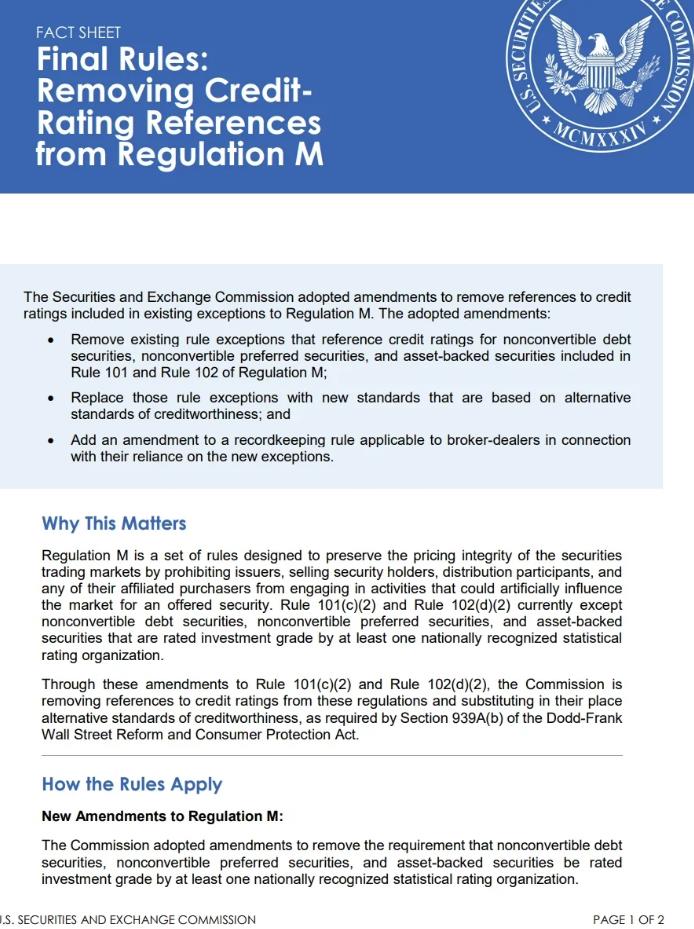Source: https://www.sec.gov/news/statement/gensler-statement-credit-ratings-060723
Today, the Commission is considering adopting a set of final rules to remove references to credit ratings from Rules 101 and 102 of Regulation M (Reg M). I am pleased to support these rules because they will fulfill an important mandate issued by Congress in the wake of the 2008 financial crisis.
In Section 939A of the Dodd-Frank Act of 2010, Congress directed federal agencies, including the SEC, “to remove any reference to or requirement of reliance on credit ratings” from our rules and to substitute an appropriate standard for credit-worthiness.[1]
This adoption will be the sixth and final of the SEC’s rulemakings to implement this mandate. The other five were finalized between 2011 and 2015, and today’s will get the job done.[2] Further, it comes after three proposals—in 2008, 2011, and most recently in 2022—that we reach today’s adoption. Guess you can say the third time is the charm.
Reg M, a 27-year old rule, prohibits parties involved in the distribution of securities from buying the securities or inducing others to buy the securities during a restricted period. Within Reg M are Rules 101 and 102, which restrict the ability of certain offering participants to transact in ways that can influence the price of the security before their participation in the distribution is deemed complete. Rules 101 and 102 currently have an exception for investment-grade securities.[3]
To fulfill Congress’s mandate, today’s adoption will modify or replace these exceptions with alternative standards of creditworthiness for three kinds of investment-grade securities.
For asset-backed securities, the new exceptions will apply to securities offered pursuant to an effective shelf registration statement filed on the Commission’s Form SF-3.
For nonconvertible securities, both debt and preferred, the new exceptions will apply to the securities of issuers whose probability of default falls below a certain threshold.
This final rule fulfills Congress’s wishes, ensuring we don’t embed in our ruleset a reliance on credit ratings—and instead have appropriate alternative measures of creditworthiness.
Final Rule (120 pages):

Fact Sheet:

Press Release:
The Securities and Exchange Commission today adopted rule changes to remove and replace references to credit ratings from existing exceptions provided in Rule 101 and Rule 102 of Regulation M, a set of rules that prohibits activities that could artificially influence the market for an offered security.
“This adoption fulfills Congress’s wishes in the wake of the 2008 financial crisis, ensuring we don’t embed in our ruleset a reliance on credit ratings – and instead have appropriate alternative measures of creditworthiness,” said SEC Chair Gary Gensler. “This adoption will be the sixth and final of the SEC’s rulemakings to implement this mandate.”
The amendments, when effective, will remove certain existing rule exceptions in Rule 101 and Rule 102 of Regulation M that reference credit ratings for nonconvertible debt securities, nonconvertible preferred securities, and asset-backed securities and substitute in their place new exceptions that are based on alternative standards of creditworthiness. These substitutes include exceptions for nonconvertible debt securities and nonconvertible preferred securities of issuers who meet a specified probability of default threshold and exceptions for asset-backed securities that are offered pursuant to an effective shelf registration statement filed on the Commission’s Form SF-3.
The Commission also adopted a record preservation requirement under Rule 17a-4(b)(17) for broker-dealers who rely on Rule 101’s or Rule 102’s new exception for nonconvertible debt securities and nonconvertible preferred securities.
The adopting release will be published in the Federal Register. The final rules will become effective 60 days after publication in the Federal Register.